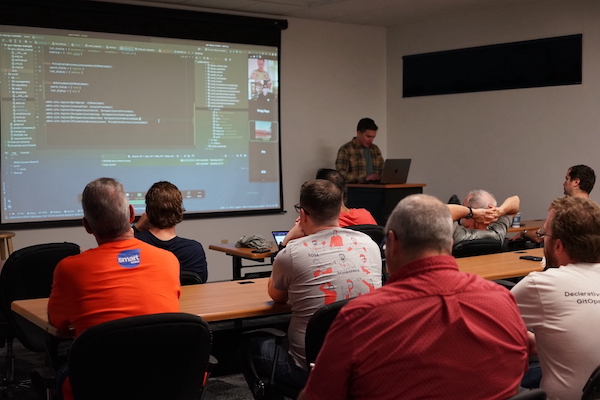This week’s Culture Builder newsletter is a guest commentary. Technical.ly CEO Chris Wink is on parental leave and will return later this month. The Culture Builder newsletter features tips on growing powerful teams and dynamic workplaces. Below is the latest edition we published. Sign up to get the next one.
But through 20 years leading a software development firm I founded, I’ve watched the focus on culture go from novelty to necessity — especially as smaller companies increasingly compete directly with big tech. That’s why I’m an avid reader of this newsletter.
Chariot Solutions, our 60-person company based in suburban Philadelphia, has goals and objectives like any other organization. We work to ensure they align with our overall mission and check them against our company culture, which is a living, breathing thing. You might say we’ve operationalized our values.
I see that focus on culture as the biggest reason why so many Chariot employees stay engaged for so long. Bureau of Labor Statistics data puts US employees’ average tenure at about four years. That number drops to as low as two at big tech firms. Chariot’s own eight-year average is both a contributor to and a symptom of our company culture.
Retention is a timely topic. Facing economic headwinds, a plurality of HR pros are shifting their top priority from recruiting to retention, according to a new report from Lattice. Innovative companies are still hiring (you wouldn’t want to over-correct) but the mood among employers clearly shifted. What do we at Chariot have to teach about keeping great people around?
Start with your company values
If your primary goal is to maximize profits and shareholder wealth, it will likely lead to a fast-paced, highly competitive, growth-oriented environment. That might work for some. But if client satisfaction and employee happiness are a higher priority, then a company’s environment and culture will reflect that.
Even the best-managed companies aren’t a great fit for everyone. Leading with your values should help you attract and retain the kinds of people who want to be there. (Editor’s note: This is where your employee value proposition comes in.)
A company’s goals and resulting culture ultimately determine its internal and external identity. That’s often called “employer brand marketing.”
Chariot chooses to emphasize client and employee growth over financial growth. As such, we invest heavily and consistently in professional development, value our people for who they are and allow them room to pursue passions — even at significant cost to the company.
Those actions speak loudly about how much we care about our people. It sends a clear message to the type of people we like to hire that we value them over money.
This deliberate strategy helped shape our industry-wide reputation for an exceptional culture, enabling us to attract top talent despite fierce competition.
Big tech companies may offer higher salaries and rich stock options — many of which are worthless now — but our reputation and company culture endured during the tumultuous pandemic. Our cultural philosophy hinges on a few key tenets.

Chariot Solutions employees during a presentation. (Courtesy photo)
Protect two-way communication
Big companies across industries often experience serious communication challenges. Even those with the best intentions struggle to make every team member feel heard and respected.
Offering employees more transparency and frequent, open two-way communication channels make a significant and inexpensive difference. By creating powerful, protected feedback loops that reach the top without fear of backlash, you can empower employees.
Extend trust
We offered a flexible work environment — now heralded as one of the strongest employee retention tools — even before the pandemic and the Great Resignation.
It was a great way to demonstrate trust and separate ourselves from other employers. When working from home became the standard, we were able to retain and even grow our team because our people returned our trust and loyalty. You’ll benefit in many ways by demonstrating how much you value your team.
Show appreciation
We show our gratitude to employees whenever possible. From individual callouts in team meetings for a job well done to company-wide celebrations at important milestones, we enjoy showcasing our people’s good work. It’s a fun way to boost morale and make sure people receive some type of credit for putting in the hard work. You don’t need big, showy rewards, but allowing people to grind away at tasks for nothing more than prayer hands in Slack is a recipe for disaster.
The overall point is to play to your company’s strengths. Big tech has long had big money. Culture and lifestyle can be your differentiating factor. In my experience, building a great culture boils down to knowing and respecting the people you hire as individuals. It can be hard to work in a large enterprise and still feel valued as a person. Give your team a sense of belonging. Companies that are people-first within have an enormous advantage.
Sign up for the Culture Builder newsletterJoin our growing Slack community
Join 5,000 tech professionals and entrepreneurs in our community Slack today!
Donate to the Journalism Fund
Your support powers our independent journalism. Unlike most business-media outlets, we don’t have a paywall. Instead, we count on your personal and organizational contributions.





